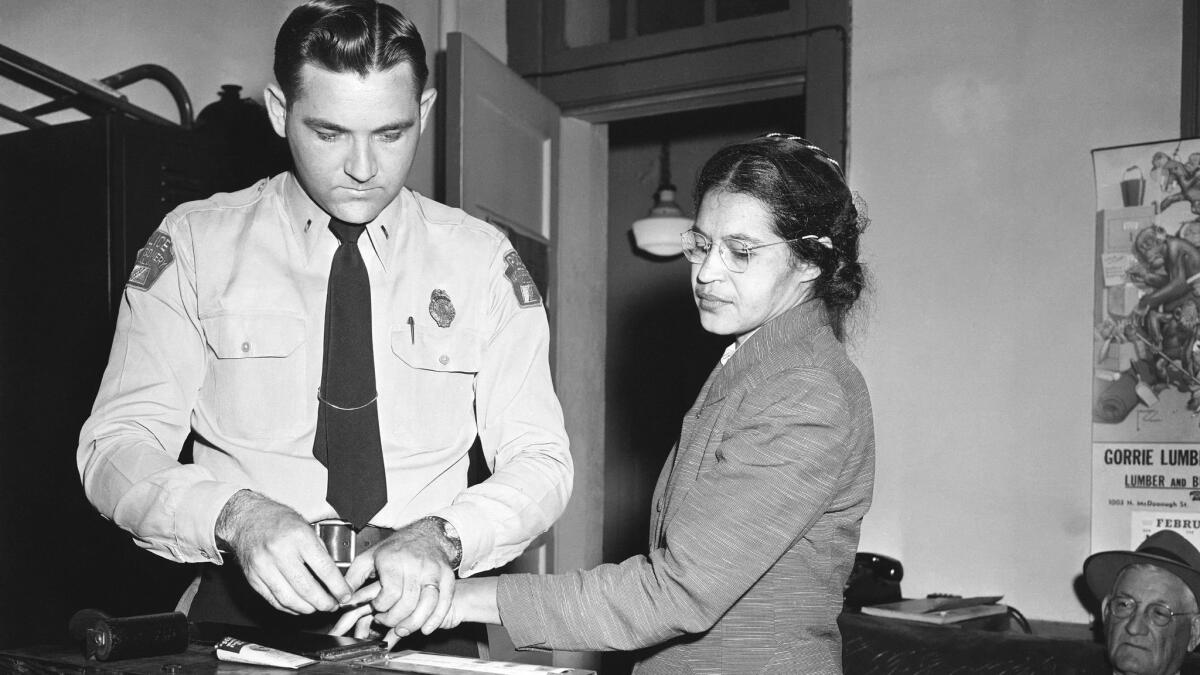Q&A: Here’s when boycotts have worked — and when they haven’t

- Share via
Actress Alyssa Milano was one of thousands who called for a one-day boycott on Thursday of FedEx, Apple TV and Amazon for not severing their ties with the National Rifle Assn. In a tweet, she included a photo of herself in front of the White House, with the words “Never Again” written on her hands in red ink.
The call for action came after Delta and United airlines, parent companies for Avis and Budget, Enterprise, National and Alamo car rentals, financial institutions and more have dropped deals with the gun rights lobbying organization since the Feb. 14 mass shooting at Marjory Stoneman Douglas High School in Parkland, Fla., where 17 people were killed.
In an effort to undermine the NRA’s clout and to pressure lawmakers to pass gun control legislation, organizations and individuals have been calling for a variety of boycotts. Among them is David Hogg, a 17-year-old senior at the school, who in a Feb. 24 tweet said that people should boycott Florida for spring break until gun reform happens. If lawmakers won’t listen to students, Hogg wrote, “maybe [they’ll] listen to the billion dollar tourism industry in FL.”
Boycotts are nothing new. Here’s a quick look at how they’ve played out in the U.S. and abroad.
Are boycotts successful?
The answer depends partly in how you define success.
“Very few boycotts have led to changes,” said Maurice Schweitzer, a professor of operations and information management at the Wharton School at the University of Pennsylvania. “Most boycotts lack a sustained effort” and people lose interest or stop paying attention, he said.
“In practice, most boycotts achieve the more modest goal of attracting media attention,” Schweitzer wrote in an email. “There are, however, hundreds of calls for boycotts each year, and most accomplish very little.”
Some targets of boycotts in recent years include BP for its role in the 2010 Gulf of Mexico oil spill, and Chick-fil-A, after Chief Operating Officer Dan T. Cathy’s comments against same-sex marriage in 2012.
Is it possible to measure a boycott’s impact?
No, not always, simply because multiple factors can influence events. Consider the case of former San Francisco 49ers quarterback Colin Kaepernick, who took a knee during the national anthem to protest racism and police brutality, launching similar protests across the National Football League. In the aftermath of his protest, Kaepernick was not signed by any team.
Kaepernick supporters urged fans to stop watching NFL games, and a Change.org petition calling for a boycott gained more than 200,000 supporters.
“Knowing that NFL owners only respond to ratings, which in turn brings money from advertisers and network partners, I felt the only way to get the owners' attention was to create a petition asking for a full boycott until Colin Kaepernick got signed,” Vic Oyedeji, founder of Unstripped Voice, a platform that promotes racial, social and economic equity, wrote in an email.
The boycott will end if Kaepernick is signed by an NFL team, Oyedeji wrote.
Viewership for the NFL’s 2017 season dropped by 9.7% compared to the previous season, according to Sports Illustrated. However, the NFL’s ratings had also dropped by 8% for the 2016 season — a year before the NFL boycott started. There is no conclusive evidence that the boycott contributed to the ratings decline when other factors — a plunge in the quality of games, growing concern of the game’s violence — are at play.
“Boycotts are rarely the precipitating factor for change. Rather, they bring attention to an issue and signal the magnitude and intensity with which a group feels a particular way,” Schweitzer said. “In most cases, a small minority of people call for a boycott that the wider community fails to support by taking substantive action.”
Have boycotts helped change public opinion?
Yes, and perhaps one of the best examples comes from the civil rights era, when a boycott rose out of tensions over public buses in Montgomery, Ala.
One day in 1955, 15-year-old Claudette Colvin was dragged off a bus by police officers for sitting in the whites-only section. Nine months later, Rosa Parks refused to leave her seat on a Montgomery bus.
Blacks began boycotting the public buses, and soon the Rev. Martin Luther King Jr., the Rev. Ralph Abernathy and other civil rights leaders joined their cause. Despite King and Abernathy’s houses being firebombed, they did not stop. “My intimidations are a small price to pay if victory can be won," King said.
A federal court eventually ruled that bus segregation was unconstitutional and violated the equal protection provisions of the 14th Amendment. The boycott, along with Parks’ arrest, cast a harsh spotlight on the inequities African Americans suffered in the Jim Crow South.
Are there other examples of boycotts influencing public opinion?
In 1965, Cesar Chavez and the National Farm Workers Assn. urged the public to boycott grapes to compel growers to provide better pay and working conditions. The boycott targeted nonunion grape businesses.
The National Farm Workers Assn. joined the Agricultural Workers Organizing Committee to form United Farm Workers and increase attention on their boycott. Millions showed solidarity by not purchasing grapes until the UFW signed its first union contracts.
Another major boycott, which won support from across the globe as well as the U.S., targeted South Africa and its system of racial segregation known as apartheid. Individuals as well as companies and governments boycotted the country. Tourists refused to travel there, companies would not do business there, artists would not perform there. South Africa was excluded from the Olympics for decades.
In 1986, Congress voted to override a veto by President Reagan to enact the Comprehensive Anti-Apartheid Act. The act banned South African imports, airlines and foreign aid from the U.S. International companies began leaving South Africa in droves, causing significant losses in revenue and jobs there.
Leader P.W. Botha resigned in 1989, and his successor, F.W. de Klerk, lifted a ban on the African National Congress and freed Nelson Mandela and all political prisoners in 1990.
In 1993, the U.S. sanctions against South Africa were lifted after De Klerk announced a completely representative democratic process for their presidential election. The following year, Mandela was elected as South Africa’s first black leader and apartheid was dismantled.
The Montgomery bus and South Africa boycotts “are the exceptions, rather than the rule, of boycotts that ended with the desired policy change,” Schweitzer said.
Do boycotts inflict economic harm?
Sometimes, yes. The liberal polling firm Center for American Progress wrote a 2010 report called "Stop the Conference" that estimated that Arizona lost $45 million in convention business because of a boycott called after passage of SB 1070, a tough law targeting illegal immigration.
Most recently, boycotts targeted North Carolina after the passage of the Public Facilities Privacy & Security Act, commonly known as House Bill 2, which blocked localities from passing protections for the LGBTQ community and instructed transgender people to use the bathroom of the sex they were assigned at birth.
In response to the passage of HB2, several organizations and agencies boycotted North Carolina. The Los Angeles County Board of Supervisors wrote a letter to then-North Carolina Gov. Pat McCrory to say county employees were barred from visiting the state for county business.
“We echo the overwhelming criticism expressed by local governments in your state and throughout the nation that have passed resolutions calling for the repeal of HB2,” the letter read. The board joined 28 other counties, seven states and the District of Columbia, and 29 cities in barring employees from traveling to North Carolina.
Professional and collegiate sports leagues like the National Collegiate Athletic Assn., Atlantic Coast Conference and the Central Intercollegiate Athletic Assn. all pulled significant events from the state. The NBA announced on July 21, 2016, that the league would move its 2017 All-Star Weekend from Charlotte to New Orleans. The loss of revenue to North Carolina was estimated at $100 million.
Entertainment company Lionsgate canceled filming of its Hulu series “Crushed” in Charlotte. 21st Century Fox, A&E Networks and Turner Broadcasting said they would not consider North Carolina for future production if HB2 were not repealed.
In all, the state lost more than $3.76 billion, according to an Associated Press analysis.
Once HB2 was repealed and replaced, those corporations and organizations agreed to do business with North Carolina again.
michael.livingston@latimes.com
Twitter: @mikelive06
Sign up for Essential California
The most important California stories and recommendations in your inbox every morning.
You may occasionally receive promotional content from the Los Angeles Times.








